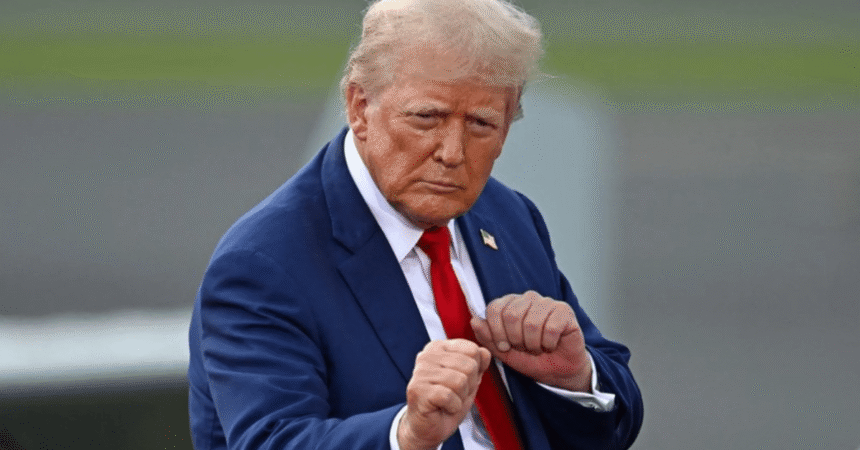In a striking statement, former President Donald Trump accused tech giant Google of displaying only negative stories about him while allegedly favoring positive coverage of his Democratic rival, Vice President Kamala Harris. This accusation, delivered via a post on Truth Social, has sparked significant debate regarding media bias, the influence of technology companies in elections, and the broader implications for free speech and information access in a digital age.
The Accusations
Trump’s comments came after a conservative group conducted a search for “Donald Trump presidential race 2024,” claiming the results were skewed against him. In his post, Trump asserted that Google’s search engine engages in “illegal activity” by promoting content that could hinder his political aspirations. He expressed his belief that the Justice Department should criminally prosecute Google for this alleged interference in the electoral process. “If not, and subject to the Laws of our Country, I will request their prosecution, at the maximum levels, when I win the election,” Trump declared.
This outburst reflects a broader narrative within certain political circles that technology companies manipulate information to influence public opinion and election outcomes. Trump’s frustrations resonate with a significant portion of his base, who have long claimed that mainstream media and major tech platforms exhibit bias against conservative viewpoints.
Google’s Response
In response to Trump’s claims, Google issued a statement clarifying its position on search results and political neutrality. The company highlighted that both candidates’ campaign websites generally rank at the top for relevant search queries. “This report looked at a single rare search term on a single day a few weeks ago, and even for that search, both candidates’ websites ranked in the top results on Google,” a Google representative noted.
Google’s assertion underscores the complexities involved in search algorithms, which prioritize factors like timeliness, relevance, and popularity when displaying search results. The company has repeatedly emphasized its commitment to neutrality, stating that it does not manipulate search outcomes to favor any particular candidate or political party.
The Broader Context of Tech and Politics
Trump’s accusations come amid a tumultuous political landscape marked by increasing scrutiny of technology companies’ roles in society. The intersection of social media, search engines, and politics has become a focal point of debate, particularly concerning issues of misinformation, censorship, and the power of algorithms to shape public discourse.
The rise of digital platforms has transformed how individuals consume news and information. With algorithms determining the visibility of content, concerns have emerged regarding the potential for bias—both perceived and real. Critics argue that if a platform’s algorithms favor certain narratives over others, it could have significant implications for democracy, especially during election cycles.
In the case of Trump, his administration had previously taken steps to challenge the perceived bias of tech companies. Initiatives included discussions around Section 230 of the Communications Decency Act, which grants immunity to online platforms for content posted by users. The former president’s administration aimed to hold tech companies accountable for content moderation practices, arguing that such measures disproportionately impacted conservative voices.
Legal Implications of Trump’s Threat
Trump’s vow to prosecute Google raises critical questions about the legal landscape surrounding tech companies and free speech. The implications of such a threat extend beyond Trump himself, touching on First Amendment rights and the regulatory frameworks governing digital platforms.
Legal experts suggest that prosecuting a tech company for bias in search results would face significant challenges. The First Amendment protects companies’ rights to determine their content policies, which courts have generally upheld. Additionally, the notion of “illegal activity” related to search results is murky, as it would require a clear legal standard for what constitutes bias or interference.
Moreover, the concept of “interference” in elections is typically reserved for actions that could directly influence voting outcomes, such as misinformation campaigns or foreign interference. Proving that a search engine’s results directly alter voter behavior would be a daunting task, requiring extensive evidence and analysis.
Public Reactions and Political Ramifications
Reactions to Trump’s accusations have been polarized. Supporters within his base have rallied around the claims, echoing sentiments that mainstream tech companies are biased against conservatives. For them, Trump’s challenge to Google resonates as part of a larger struggle against perceived elitism and control exerted by Silicon Valley.
Conversely, critics argue that Trump’s comments reflect an attempt to deflect attention from his legal troubles and undermine trust in established media and technology institutions. Detractors caution that such rhetoric could lead to dangerous precedents, fostering an environment where companies may feel pressured to alter their policies to appease political figures.
The ramifications of these tensions are likely to play out in the 2024 presidential election. With Trump running for office again, the narrative surrounding media bias and the role of technology in elections is poised to become a central theme in his campaign strategy. By framing himself as a victim of systemic bias, Trump may galvanize support among his base while simultaneously rallying skepticism about the integrity of mainstream media.
The Future of Media and Technology
As discussions around Trump’s accusations unfold, they reflect a broader conversation about the future of media, technology, and democracy. With the rise of artificial intelligence and machine learning, the algorithms that govern search engines and social media platforms are becoming increasingly complex and influential. This evolution raises important questions about accountability, transparency, and the ethical responsibilities of tech companies.
The push for regulatory reforms in the tech sector is gaining momentum, as lawmakers grapple with how to manage the immense power held by a few dominant companies. Calls for increased transparency regarding algorithms and content moderation policies are becoming more prevalent, with advocates arguing that the public deserves to understand how information is curated and disseminated.
Furthermore, as misinformation continues to plague online platforms, the role of tech companies in combating false narratives is under scrutiny. Striking a balance between free expression and responsible information sharing is a pressing challenge for policymakers and industry leaders alike.
Trump’s accusations against Google serve as a microcosm of the larger issues at play in the intersection of technology, politics, and media. As the landscape continues to evolve, the implications of these discussions will undoubtedly shape future electoral politics and influence public discourse.
As the 2024 election approaches, the dialogue surrounding media bias, the role of tech giants, and the future of democratic engagement will remain critical. The outcome of these discussions may determine how candidates like Trump navigate the digital landscape and engage with their supporters in an increasingly interconnected world.
#Trump #Google #Election2024 #MediaBias #TechPolitics #DigitalDemocracy #SocialMediaInfluence #FreeSpeech







